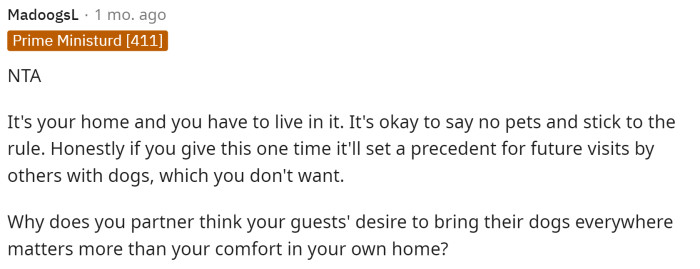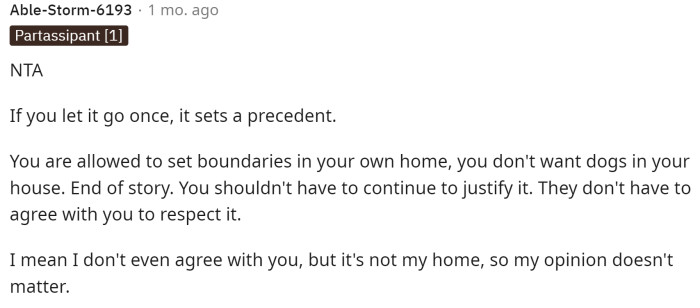Couple Doesn't Want Dogs In Their Home, But Family Insists On Bringing Their Newfoundland When Visiting
Reddit is doing us a favor with these dog posts on the AITA threads. We love covering these posts because they provide insight into people's lives and situations while offering us different perspectives to consider.
People often come to Reddit to ask if they are wrong for how they reacted in a situation, and this time, it's about a family that doesn't want dogs inside their home. We've said this before, but people can pretty much do whatever they want and establish whatever rules they desire inside their home because it's their home.
However, we understand why some people might be upset about not being able to bring their dogs or do whatever they want. With that said, we wanted to cover this post because it received quite a few different comments, providing various perspectives and opinions.
Ultimately, this couple is saying no to a Newfoundland, which is a giant, fluffy dog, and we can't blame them for not wanting it inside their normally pet-free home. So, without further ado, let's dive in and check out this post and all the comments that people made in response to it.
OP starts off by explaining that they don't want any pets and don't have any pets of their own.

They mentioned that their partner's parents always try to show up with their dog, which they turn away.

OP states that they were asked to bring the dog to visit, but OP is standing their ground and saying no.

Personal Preferences and Boundaries
The desire to maintain a pet-free home often stems from personal experiences and lifestyle choices. Research from the Journal of Environmental Psychology highlights that individuals create personal spaces that reflect their values and preferences, which can include having or not having pets.
When family members disregard these preferences, it can lead to frustration and feelings of disrespect.
OP provides a few details on why they don't want this large dog inside their house.

OP mentions that they've had a long day, so maybe they're overreacting. Then they share a brief edit to clarify some things.

The size of their home also matters because, again, it's a pretty large dog that they're looking to bring.

Understanding the psychological constructs of autonomy and control can shed light on why some individuals feel strongly about their living environment. Studies suggest that having control over one’s surroundings plays a crucial role in emotional well-being and stress reduction.
In this case, allowing family members to bring pets into the home may undermine that sense of control, leading to heightened tension.
The first comment states that they are NTA and that saying yes, even this one time, could set off a chain reaction of bringing the dog.

People ultimately say that it's OP's house, so it's their rules, and the parents should respect that decision.

Some pet owners seem to understand this, while others just don't grasp why anyone could say no to their dog.

The Importance of Family Communication
Effective communication within families is essential for navigating differing preferences regarding pets. Research from the Family Relations journal emphasizes that open discussions can help families understand each other's viewpoints and find common ground.
Encouraging family members to express their feelings about pets can lead to more harmonious relationships and prevent conflict.
Establishing clear agreements about house rules can also help mitigate misunderstandings.
This is important. They are allowed to set boundaries for their home, and they should expect everyone to abide by them.

This is also true. They've already had this rule in place, so it's not like it's out of the blue that they are saying no.

We understand not wanting to argue, but rules are rules, and the parents are OP's partner's, not OP's parents.

To address concerns about having dogs in the home, families might consider creating a pet policy that outlines specific guidelines for visits. This approach can respect the preferences of all family members while ensuring guests feel welcome.
Research indicates that collaborative decision-making fosters a sense of teamwork and solidarity among family members.
By involving everyone in the process, families can create an environment that honors individual preferences and strengthens relationships.
After all this, we definitely have to agree with the comments below the post. Most everyone said that OP is NTA and that it's their house, so it's essentially their rules.
You can't force someone to take in your dogs, and you just have to understand their perspective when they tell you that they don't want you to bring it.
Psychological Analysis
This situation underscores the significance of personal boundaries in family dynamics. When family members impose their preferences on others, it can lead to tension and conflict.
Recognizing and respecting these boundaries is crucial for maintaining healthy relationships within the family.
Analysis generated by AI
Analysis & Alternative Approaches
The complexities of family dynamics highlight the importance of personal preferences and boundaries regarding pets.
Research suggests that fostering open communication can significantly improve family relationships and prevent conflicts.
Ultimately, creating shared agreements regarding pets can lead to a more respectful and harmonious family environment.



